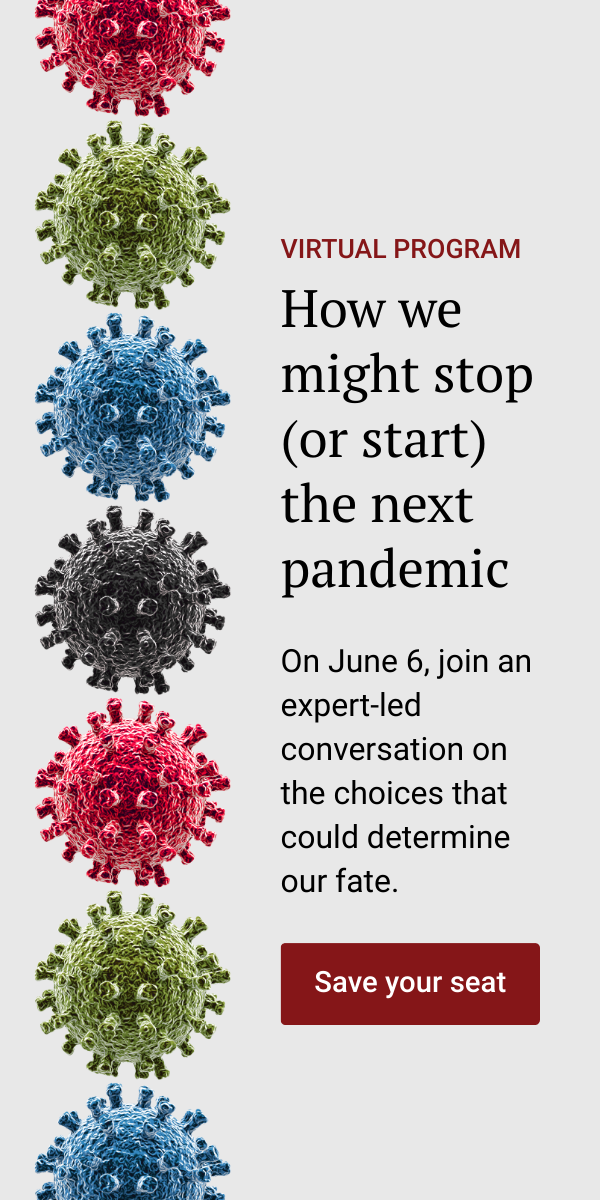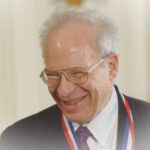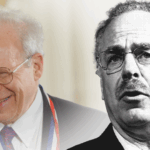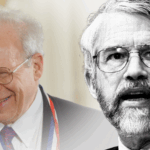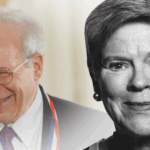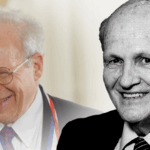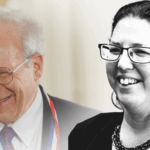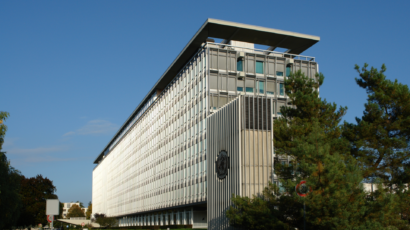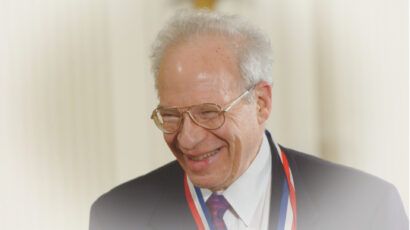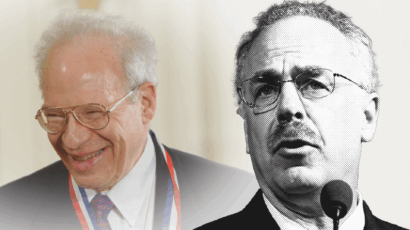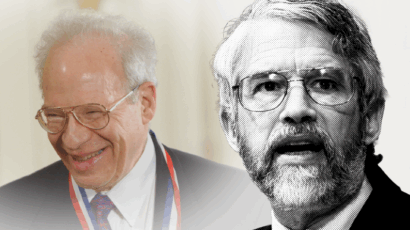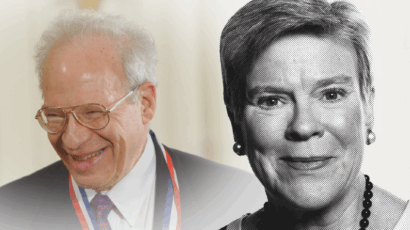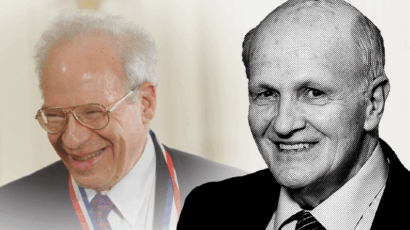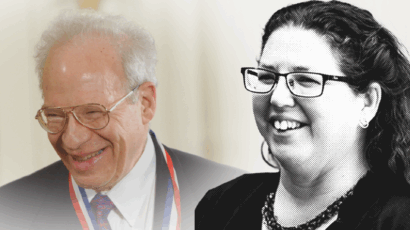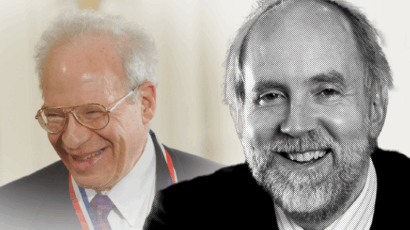Ukrainian journalist Illia Ponomarenko on the horror and absurdity of Russia’s senseless, existential war
By Susan D’Agostino | May 3, 2024
 Illia Ponomarenko, former defense reporter for the Kyiv Independent.
Illia Ponomarenko, former defense reporter for the Kyiv Independent.
In Google Maps, all streets leading out of Kyiv were shaded red. Ukrainian journalist Illia Ponomarenko got in the car anyway, despite not having slept in 60 hours. His Russian-speaking mom was along for the ride and driving him nuts. (She had not wanted to leave her home in Donbas.) Months earlier, he had met Natalia. Now, he was headed to meet her parents, Galyna and Oleksander, for the first time. He hoped to make a good impression but also needed to ask a favor. Would they house his mom—someone they also had never met—in their small, wood-fire-heated cottage with a fruit garden in the yard for an undetermined period of time?
One day earlier, Russia had invaded Ukraine. And within a day, Ponomarenko would head back to Kyiv to resume reporting for the Kyiv Independent—a fledgling startup that did not yet have an office.
“Happy 30th birthday to me,” Ponomarenko recounted about the day of the 12-hour drive in his new book, I Will Show You How It Was: The Story of Wartime Kyiv (Bloomsbury, 2024). “If you ever need tips on how to have the world’s worst meet-and-greet with your partner’s mom and dad, feel free to contact me.”
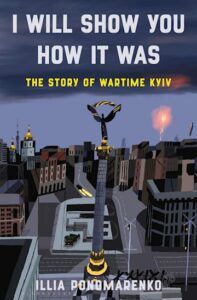 But the gathering, which included another family that had fled Kyiv, felt like a “hearty family weekend in the countryside.” Galyna and Oleksander were glad to take in Ponomarenko’s mother for any amount of time. They thanked him for having encouraged Natalia to leave Kyiv earlier. Ponomarenko slept. In the background, a television broadcast showed what looked like a nearby apocalypse—people fleeing Russian missile strikes as tanks and helicopters descended on formerly peaceful residential neighborhoods.
But the gathering, which included another family that had fled Kyiv, felt like a “hearty family weekend in the countryside.” Galyna and Oleksander were glad to take in Ponomarenko’s mother for any amount of time. They thanked him for having encouraged Natalia to leave Kyiv earlier. Ponomarenko slept. In the background, a television broadcast showed what looked like a nearby apocalypse—people fleeing Russian missile strikes as tanks and helicopters descended on formerly peaceful residential neighborhoods.
Everyone showed up as their authentic selves, according to Ponomarenko. He was “mad as hornet” but not defeated. Galyna’s hot coffee, pancakes, chocolate, cheese, vegetable salad, roasted chicken, and parsley potatoes with mushroom sauce nourished him.
“Under those circumstances, you drop a lot of artificial problems in your head, like being shy of your girlfriend’s dad or being afraid to face this moment,” Ponomarenko told the Bulletin. “War is about life itself. That was life at the very extreme. It holds beautiful and ugly things all together.”
On the pages of his book, Ponomarenko howls in despair. “Tatters of frayed cloth, boot bottoms, clumps of earth mixed with clotted blood, pockets of foaming fluids … blackened fingers barely distinguishable from the dirt of their internment.” Then, with scant notice, battlefield marriage proposals, quickly officiated by chaplains who happened to be nearby, after which the newly married couples climbed back into trenches to resume their roles as Ukraine’s David against Russia’s Goliath.
This is not the book Ponomarenko had planned to write. Initially, he imagined a military history book focused on the battle of Kyiv as a cornerstone event in modern European history. That book would have been technical. Think weapons, armor, trench systems, tactics, timelines, and lots of maps with arrows.
But on the day of the invasion, Putin issued a statement that was widely interpreted as a nuclear threat. For Ponomarenko and so many others, life got existential fast. Any notion of writing a straightforward military history book evaporated on that day. In its place, something more visceral emerged. I Will Show You How It Was captures the beauty, tragedy, and chaos of ordinary people working in earnest to save themselves—and humanity.
“When war comes, you have to think about your survival and that of your loved ones, apart from doing your job,” Ponomarenko said. “You are a victim of this war too, apart from being a war reporter.”
For this reason, battles in the book are depicted not by maps with arrows but by phone conversations in which Natalia asks, “What’s that sound on your end?”
“Sweetie, we’re being bombed right now,” Ponomarenko replies.
In describing the Russians’ initial drive on Kyiv, the author steers clear of straightforward journalistic prose. Instead, Ponomarenko invites Russian President Valdimir Putin to “shoot himself in the fucking throat.” By addressing readers as fellow humans, even friends, he lays bare human emotions in all their complexity.
“It comes with lots of swear words,” Ponomarenko acknowledges. “I’m not proud of that, but still, it’s a sincere conversation between humans. It’s a giant emotional seesaw. It’s less formal but more descriptive. … Half of the world was burying Ukraine alive, giving us 42 to 72 hours. Not much hope. So many odds against us. We were facing a giant death army that was absolutely prepared to finish us off within days.”
Both before and after the start of the war, the Bulletin and other media outlets published stories about Ponomarenko; in the Bulletin, I called him a “dude from Donbas.” In this sense, the book is less a debut than a sequel. Readers will find an old friend on the pages of I Will Show You How It Was. In this installment, Ponomarenko recounts the time he reasonably believed he was facing doomsday.
The author’s trademark mix of optimism and irreverence is evident on every page of the book. In an earnestness that is as extraordinary as it is moving, he rallies humanity—by way of his journalism and Twitter (now X) following—to support Ukraine. By all accounts, he succeeds. Der Speigel, for example, dubbed Ponomarenko “likely the best-known Ukrainian after President Volodymyr Zelenkskyy.” Diplomats, policy analysts, and millions (literally) of people around the world follow his chronicle of the war.
At the heart of this book, readers will also discover an appealing youthfulness. When Russia bombs Ukraine, for example, Ponomarenko responds with … name calling. Putin is a “maniac,” a “man obsessed with his ego,” and an “aging dictator obsessed with pseudo-historical conspiracy theories.”
Before the war started, Ponomarenko’s former employer, the Kyiv Post—the country’s then-largest and oldest independent English-language newspaper—shut down. Ponomarenko and his colleagues saw it as an attempt to purge “inconvenient, fair, and honest journalists.” In response, the group launched their own newspaper, the Kyiv Independent. Reflecting on that moment in the book, Ponomarenko asks, “If you have nothing left to lose, why not try to do something nearly impossible and truly remarkable?”
Readers may be forgiven for mistaking this as a question directed at them—about their own lives, wherever they may be. Ponomarenko cultivates an enviable intimacy with his readers. By his telling, he’s “just one of million people living in Ukraine who happened to be a journalist who happened to get a lot of attention during this unique historical event.” He’s as surprised as anyone by the attention. To reciprocate, he’s committed to fostering a bond with those who read his prose.
“Most people are good human beings,” Ponomarenko said. “They sympathize. They listen to many Ukrainians telling stories about this war because this is about universal values that anybody in the world appreciates and loves. We all want to be free, alive, and happy.”
In conversation, Ponomarenko’s intelligence is palpable, if unfussy. Doomsday, for example, is “not only death but also the end of so many dreams.” As a front-line war reporter, he is not trying to be a professor. (This is someone who’s prepared to use a condom as a tourniquet to stop bleeding.) Yet his words manage to distill Russia’s critical mistake.
“Russia involved itself in Ukraine in such a black-and-white war,” he said. “That absolutely guaranteed Ukrainian support on the emotional level from so many people. They buried themselves with this evil that they do.”
The book doubles as an ode to those who, during the battle for Kyiv, played guitars for children in subway bomb shelters, enlisted in the territorial defense wearing old sneakers and fatigues from the nearest hunting shop, stepped up to serve as radio hosts, fed the elderly, and brought food and medicine to the military. “When you see the greatest acts of pure heroism done by so many people and when this eventually comes with success, it’s almost a man-made miracle,” Ponomarenko said. “That changes you.”
Ponomarenko occasionally interrupts his feel-good musings to challenge readers, especially those from the West. Weeks before the war started, for example, Reuters had installed a 24/7 webcam in Kyiv whose feed showed a square from the height of the Hotel Ukraine.
“So, you Westerners want to enjoy the fun of a live missile attack on YouTube?” he asked in the book. But in a whiplash characteristic of the narrative, Ponomarenko credits that same gaze from horrified people around the globe with helping Ukraine endure.
“The temptation to throw Ukraine under the bus was insane,” he said. “But people started listening. … Millions of people still care, and I can feel this. We can see this.”
A decade or so ago, Ponomarenko was an international relations and nuclear policy student in Mariupol. That’s when he first started reading the Bulletin of the Atomic Scientists. Now, I ask, what does he want the world to know about nuclear risk?
Russian success in Ukraine, he says, “would encourage Russia, Iran, China—dictatorial regimes around the world—that … nuclear intimidation works. … It helps get things from democracies, from the free world.”
Ukraine once possessed nuclear weapons but later surrendered them, he recalls. Now, he worries that small, non-nuclear nations may draw a concerning lesson from the current war.
Many nations, he fears, may simply decide, “to hell with this nonproliferation, to hell with these security assurances and affirmations; it’s time to go nuclear, because the bomb is what really provides a guarantee against an invasion in this new world, where wars of conquest and impatience and nuclear extortion works.”
“It’s absolutely vital that smaller nations under attack—especially when it comes to nations that base unjustified, unprovoked, invasions such as what we have, especially when it comes to fighting one of the world’s largest war machines such as Russia, with immense resources—it’s absolutely vital that such nations get absolutely unconditional support. It’s absolutely vital that dictatorial warmongering regimes get the signal of no admission and get the clear understanding of no possibility of wars of conquest.”
“Today it’s Ukraine,” he adds. “So many decision makers, leaders, and loud voices are asking, ‘Why fight for Kyiv?’ ‘Why help Ukraine?’ Tomorrow it will be, ‘Why help Warsaw?’ ‘Why help Tallinn?’ It’s no surprise that … Article 5 is the big question right now.”
Article 5 of the North Atlantic Treaty Organization (NATO) provides for collective defense of member countries. That is, an attack against one member of NATO is an attack against all. Ukraine is not a member.
“Evil must be resisted. Otherwise it grows bigger, and it gets even more dangerous. You can’t avoid history. You can’t avoid decisions that are absolutely necessary. It’s not our choice to be or not to be in this situation. The war comes and decisions need to be made. Otherwise it will only grow worse. There’s no way to put a head in the sand.”
Ponomarenko’s book lands more than two years after the start of the war. Earlier this year, President Zelenskyy acknowledged that 31,000 Ukrainian soldiers have died, though US intelligence suggests that’s an underestimate. Thousands of Ukrainian prisoners of war have also returned with psychological wounds stemming from torture, according to the New York Times. In Russia, more than 50,000 soldiers have died, according to the BBC. That’s a staggering toll, especially as no end is in sight.
“I’m glad that my book comes at this complicated time,” Ponomarenko said. “We could use some hope in this day. I hope my book will remind some people of the spirit of the battle of Kyiv. … We proved to ourselves who we are. These choices really played well for us. We are not ashamed to remember those days.”
Last year, Ponomarenko left his reporting job to complete his book. Today, he is a one-man media organization, helping others around the world understand how war touches human lives. He is supported by followers on X and Bluesky who voluntarily donate amounts equivalent to the price of a cup of coffee.
“It works,” he said, adding that many more people read his social media missives than did his journalism.
But I Will Show You How It Was is not only about little-known heroes who have stepped up to defend against existential threats to humanity. The book is also a valentine to pre-war Kyiv.
Ponomarenko, recalling when he landed in Kyiv nearly a decade ago, takes readers on a walk through this city that was always about “starting from scratch and making your way.” People laugh as they chat on benches in Mariinsky Park. They eat ice cream in the shade of century-old trees. When the temperature drops, they drink hot mulled wine from paper cups. Hipster coffee shops, street musicians, and “god-awful” flea markets next to subway stations contribute to the city’s “easy-going mess.” People sneak peaks at the former home of Mikhail Bulgakov, author of The Master and the Margarita. When the sun goes down, the city lights shimmer on the Dnipro River “as far as the eyes can see.”
This lively book is also dense with “wild yarns and crazy legends.” Did a Ukrainian woman really down a Russian drone with a cucumber jar? Amid the backdrop of Russian missile strikes, did a grocery store clerk really announce on the loudspeaker, in a remarkable display of aplomb, “Dear customers! Don’t forget to check for discounts! Sausages, special beer brands brewed just for you, baby food! New special deals this week only!”
“I want my audience and readers to understand the extremely shocking nature of this war,” he said. “We saw mass graves on parking lots in our communities, in our cities, next to our supermarkets. … It could happen to anyone.”
Together, we make the world safer.
The Bulletin elevates expert voices above the noise. But as an independent nonprofit organization, our operations depend on the support of readers like you. Help us continue to deliver quality journalism that holds leaders accountable. Your support of our work at any level is important. In return, we promise our coverage will be understandable, influential, vigilant, solution-oriented, and fair-minded. Together we can make a difference.
Keywords: I Will Show You How It Was, Illia Ponomarenko, Russia-Ukraine war, dude from Donbas
Topics: Analysis, Book Review, Nuclear Risk

